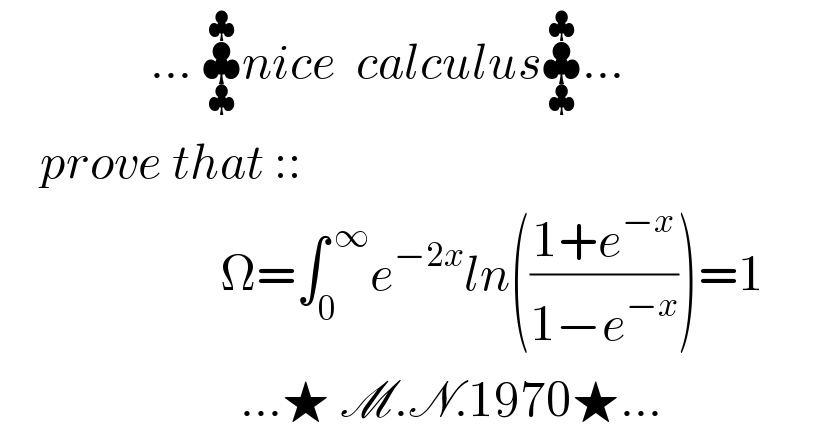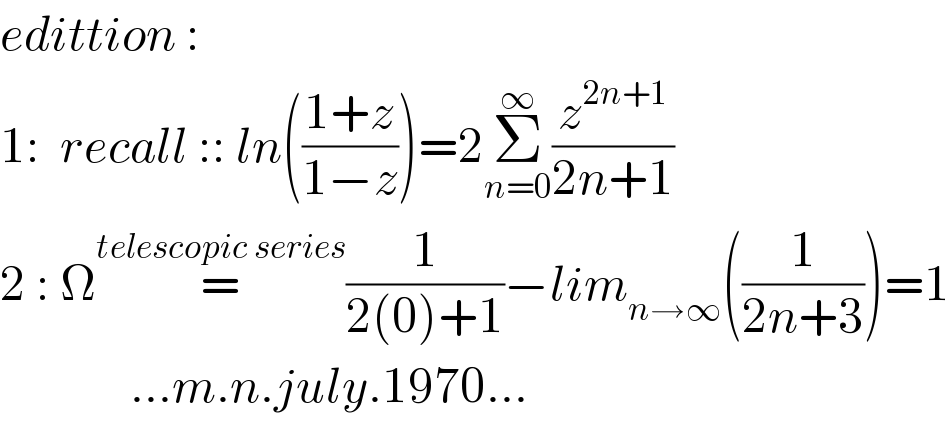
Question and Answers Forum
Question Number 119570 by mnjuly1970 last updated on 25/Oct/20

Answered by mindispower last updated on 25/Oct/20
![e^(−2x) =e^(−x) ∗e^(−x) let t=e^(−x) ⇒dt=−e^(−x) dx ⇔=∫_0 ^1 tln(((1+t)/(1−t)))dt=−∫_0 ^1 tln(((1−t)/(1+t)))dt x=((1−t)/(1+t))⇒t=((1−x)/(1+x)),dt=((−2)/((1+x)^2 ))dx ⇔−2∫_0 ^1 ((1−x)/((1+x)^3 ))ln(x)dx =−2[((1/((1+x)))−(1/((1+x)^2 )))ln(x)]_0 ^1 +2∫((1/((1+x)x))−(1/(x(1+x)^2 )))dx =2∫_0 ^1 (1/((1+x)^2 ))=2[−(1/((1+x)))]_0 ^1 =2.(1/2)=1](Q119589.png)
Commented by mnjuly1970 last updated on 25/Oct/20

Answered by mathmax by abdo last updated on 25/Oct/20
![I =∫_0 ^∞ e^(−2x) ln(((1+e^(−x) )/(1−e^(−x) )))dx ⇒I =∫_0 ^∞ e^(−2x) ln(1+e^(−x) )dx−∫_0 ^∞ e^(−2x) ln(1−e^(−x) )dx =H−K H =∫_0 ^∞ e^(−2x) ln(1+e^(−x) )dx =_(e^(−x) =t) −∫_0 ^1 t^2 ln(1+t)(((−dt)/t))dt =∫_0 ^1 tln(1+t)dt =[(t^2 /2)ln(1+t)]_0 ^1 −∫_0 ^1 (t^2 /(2(1+t)))dt =((ln2)/2)−(1/2)∫_0 ^1 ((t^2 −1+1)/(t+1))dt =((ln2)/2)−(1/2){∫_0 ^1 (t−1)dt+∫_0 ^1 (dt/(t+1))} =((ln2)/2)−(1/2){[(t^2 /2)−t]_0 ^1 +ln(2)} =−(1/2)(−(1/2))=(1/4) K=∫_0 ^∞ e^(−2x) ln(1−e^(−x) )dx =_(e^(−x) =t) −∫_0 ^1 t^2 ln(1−t)(((−dt)/t)) =∫_0 ^1 tln(1−t)dt =[(1/2)(t^2 −1)ln(1−t)]_0 ^1 −∫_0 ^1 ((t^2 −1)/2)×((−1)/(1−t))dt =−(1/2)∫_0 ^1 (t+1)dt =−(1/2)[(t^2 /2)+t]_0 ^1 =−(1/2)((3/2))=−(3/4) ⇒ I =H−K =(1/4)+(3/4) ⇒ ★ I =1★](Q119607.png)
Commented by mnjuly1970 last updated on 25/Oct/20

Commented by Bird last updated on 25/Oct/20

Answered by mnjuly1970 last updated on 25/Oct/20

Commented by mnjuly1970 last updated on 25/Oct/20

